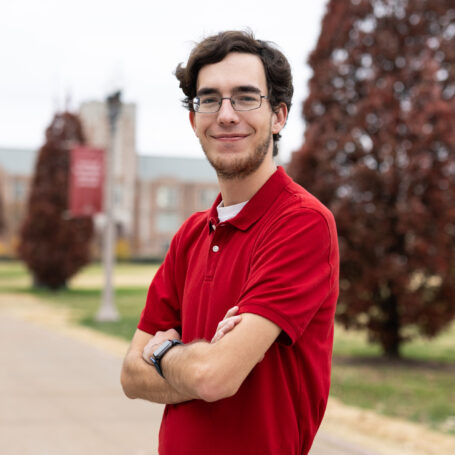
WashU senior Matthew Inman said that he didn’t really choose to come to WashU, rather, WashU chose him.
“I’m a QuestBridge Scholar and I matched with WashU during that process,” explained the Stark, Kan. – population 69 – native. “When I got the email that I was accepted to WashU, it was very much a shock. A full ride scholarship over four years is an amount of money that can sustain you for a very long time in southeast Kansas. As a kid who grew up on a farm and never had much money, that was a lot, something that my family and I were not expecting, and it took a while to sink in.”
QuestBridge is a non-profit organization that partners with WashU and other leading universities to provide a full scholarship to high-achieving, low-income youth. At WashU, QuestBridge Scholars are invited to participate in the Taylor Stars program, which provides first-generation, limited-income (FGLI) undergraduate students the infrastructure of support to assist with their transition to and through college.
A full ride scholarship over four years is an amount of money that can sustain you for a very long time in southeast Kansas.
For Inman, that infrastructure and support was critical, especially his first semester on campus which he described as difficult academically, socially, and culturally. Not only was his first semester on campus socially isolating due to the pandemic, but he faced a sense of academic overwhelm and that he was maybe a little bit different than his peers.
So, he began meeting weekly with his aspirational peer mentor (APM), provided through the Taylor Stars program, which he said not only helped him academically but also gave him a sense of social and community connection, something he really needed in that moment.
“I would not still be here had it not been for the APM that I met with for one hour a week,” he said. “I was also very lucky with my college writing course. My instructor Kasey Grady was also from a rural, first-gen background, and she very much affirmed what I was feeling – that I was different from my surroundings, but that it was ok.”
Inman said he is exceptionally grateful for the opportunity afforded to him to study at WashU, and that he is acutely aware that his scholarship relies on the generosity of others, but that there are challenges unique to FGLI students, and in many cases, they need more support.
Inman mentioned that events like Parents and Family Weekend can make FGLI students unintentionally excluded because oftentimes, FGLI parents can’t attend because they don’t have paid time off from work or the disposable income for travel.
“There are financial barriers to many of the general student body’s cultural practices that keep FGLI students on the social peripheral,” he said. “Some of that includes things like taking trips during academic breaks, going out to eat with friends, being able to afford to have a car on campus, or to even have a car at all! Everything comes with a cost, and when you come from a background like mine, that can affect your social experience. Cultural adaptation of being more inclusive to FGLI students will take some time.”
Everything comes with a cost, and when you come from a background like mine, that can affect your social experience.
Inman, however, has taken full advantage of the WashU programming that is available to him, which has kept him connected to other students like him, and has given him opportunities to grow as a student leader. In addition to being a Taylor Star, he served as an APM for two years, is a NASPA Undergraduate Fellow, a resident advisor (RA), a member of the Bear Patrol, serves on the Campus Life programming team, and is leading efforts to host the Midwest Affiliate of College and University Residence Halls Regional Leadership Conference with ResLife. Because of these experiences, Inman has his sights set on a career in higher education administration.
“I’ve discovered a passion for working with college students based on my time as an APM and a RA,” he said. “Working with college students and seeing how much they grow, especially during that first year, that’s what makes me excited.”